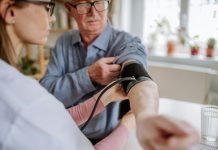
The 2016 U.S. presidential election may have worsened some heart problems for people with underlying cardiovascular disease, according to two new studies that suggest the stress and anger some people experience during elections can harm heart health.
The campaigns and election may have increased potentially life-threatening irregular heart rhythms and worsened high blood pressure in people with a history of these conditions, the research showed.
One study appeared Thursday in the Journal of the American Heart Association.
The second study will be presented Friday at the American Heart Association’s virtual Epidemiology, Prevention, Lifestyle & Cardiometabolic Health Conference.
“Attention to mental health issues, including stress, is an important part of routine clinical care for patients with heart disease and for the general population,” lead author of the JAHA study, Lindsey A. Rosman, said in a news release.
Rosman is an assistant professor of medicine in the cardiology division at the University of North Carolina School of Medicine in Chapel Hill.
“Being more aware of the potential stress of a presidential election could be helpful for many people,” she said.
Rosman’s study was the first to investigate whether a stressful election could trigger potentially life-threatening heart rhythms in people with implanted cardiac devices who have a higher risk of these events.
Her team compared heart rhythms for 2,436 adults, with an average age of nearly 71 years, during a six-week span two weeks before and four weeks after the 2016 election.
The study focused on people in North Carolina, a key battleground state subject to a high volume of negative political advertisements and commentary.
They found a 77% increased risk of periods in which the heart beats too fast, too slowly or irregularly; an 82% increased risk of atrial arrhythmias – abnormal rhythms that begin in the heart’s upper chambers; and a 60% increased risk in the rate of ventricular arrhythmias – abnormal rhythms involving the heart’s lower chambers that can lead to cardiac arrest.
“We also found a higher burden of atrial fibrillation, an irregular and often rapid heart rate, meaning patients spent more time per day in AFib during the election,” Rosman said.
“This is important because it can increase the risk of blood clots, stroke and other heart-related complications.”
Neither political party nor whether the person’s preferred candidate won were associated with any changes in heart health.
Rosman’s team is conducting a similar study about stress and cardiac events surrounding the 2020 U.S. presidential election, using data from a national sample of adults.
In a separate study, researchers compared nationwide blood pressure data from a sampling of U.S. adults six months prior to the 2016 presidential election with those from a separate randomly selected group of adults about a year into the new presidency.
The results being presented at the AHA conference are considered preliminary until published in a peer-reviewed journal.
Researchers found blood pressure levels rose significantly among Mexican American and Black adults who already had high blood pressure, also known as hypertension, after the election.
Blood pressure did not increase among adults whose levels were normal prior to the election, which investigators said surprised them.
“We had expected to see some changes among those who did not have high blood pressure before the election.
However, it appears that existing hypertension may have a large influence on blood pressure fluctuations related to stress,” lead study author Andrew Y. Hwang said in a news release.
Hwang is an assistant professor of clinical science in the Fred Wilson School of Pharmacy at High Point University in North Carolina.
“Close monitoring and follow-up with a primary care professional may be necessary to ensure blood pressure is managed during the election season.”
If you care about heart health, please read studies about these 3 supplements may protect against heart disease, stroke and findings of a simple, effective way to control cholesterol levels, protect heart health.
For more information about heart disease prevention and treatment, please see recent studies about new finding may lead to better treatment of irregular heartbeat and results showing that 4 things everyone can do to reduce inflammation, prevent heart disease.




